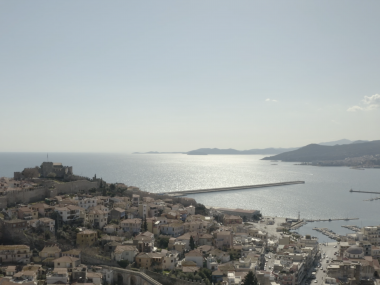Meet the partners: interview with Giorgos Michailidis
Edited on
21 May 2025 Kavala, on the Northern coast of Greece, is participating in the URGE network that aims to address some of the local challenges. Kavala through URGE also aspires to become a leader in promoting Circularity on a local level in Greece. Giorgos Michailidis Vice Mayor of Development, Planning, Digital Services and Youth, supervising the overall process from the viewpoint of an elected representative.
Kavala, on the Northern coast of Greece, is participating in the URGE network that aims to address some of the local challenges. Kavala through URGE also aspires to become a leader in promoting Circularity on a local level in Greece. Giorgos Michailidis Vice Mayor of Development, Planning, Digital Services and Youth, supervising the overall process from the viewpoint of an elected representative.

What is the URGE project in which the Municipality of Kavala participates?
URGE is a project to promote circular economy in the construction sector and is implemented under the URBACT III program aiming to promote urban sustainability. Kavala is one of the 9 European partners that are jointly try to address these challenges.
What prompted the city of Kavala to undertake such a project?
The Municipality of Kavala has already undertaken a series of initiatives for the integration of circular economy in its policies. However, the interest in this particular project was even stronger due to the significant building stock that requires demolition and also the pressures to the municipal waste management services due to the small-scale renovations of mainly short-term tourist accommodation. The significant quantities of bulky waste, as well as construction and demolition waste (C&DW), are a major challenge for the Municipality.
What other cities are participating in the project?
A total of 8 cities and 1 intermunicipal community participate in URGE, each bringing its own experience. Utrecht is implementing extensive urban development to expand the city due to population growth. Copenhagen has incorporated life cycle analysis methods for municipal projects to integrate circularity. Munich is implementing a pilot utilization and reuse of C&DW on-site for concrete production. Prato in Northern Italy is implementing a redevelopment project including the selective demolition of an old hospital and the development of a park. Maribor, through the utility company Nigrad, utilizes C&DW in the construction of a road and prefabricated concrete elements. The Oeste intermunicipal authority has taken an initiative to map local productive activities to enhance circularity, and finally, Granada is using circular economy concepts in the redevelopment of social housing buildings.
What does the Municipality have to gain from its participation in URGE?
First of all, experience and knowledge from cities that have already taken important steps in this direction. However, on a practical level, through this project, the Municipality will develop a comprehensive plan that will be implemented during the 5 years after the end of the project, i.e. until 2028. The integrated action plan for the city of Kavala aims to adopt solutions to reduce the production and management of bulky waste, the utilization of recycled C&DW in projects of the Municipality and the selective demolition for the better utilization of C&DW waste.
With these actions, the Municipality of Kavala aims to be a pioneer for circularity in the construction field in Greece and to integrate good practices horizontally in its operations. Specifically, the Municipality is already developing a pilot study for the utilization of recycled C&DW, a practice that can kickstart the market of recycled C&DW. Moreover, this practice can be easily adapted and adopted from other public bodies in the country.
It should also be noted, that the city also benefits by creating appropriate procedures for participatory and integrated development of action plans. The project is being implemented with the participation of all relevant departments of the municipality, the extensive participation of city key institutions, such as the Technical Chamber of Greece, local NGOs and associations, the university, but also the businesses that are directly concerned such as C&DW management plants and the respective recycling systems.
With the participation of the above bodies and matching the actions with specific financial tools, it is ensured that the interventions will not have a fragmented character and, above all, will not contradict other municipal initiatives.
What does the city of Kavala have to gain from this project?
It should be noted that the project has a medium-term implementation scope. At the present stage, the Municipality is examining the feasibility and the impact that actions can have. Proposed actions include a platform for the reduction and better management of bulky waste, the utilization of C&DW in municipal projects, the selective demolition of a building and more. These actions will be evaluated and matched with specific financial instruments to ensure their implementation by 2028. Therefore, we are in the phase of evaluating possible actions with the participation of local actors.
However, the project also includes a pilot implementation action. In our case, the Municipality chose to develop a model study for the utilization of C&DW in municipal projects. This study will lay the groundwork for the broader interventions discussed above.
With the above actions, the citizens of Kavala will see an improvement in the field of bulky waste management, but at the same time, there will be a significant impact in a less visible, but very important sector. Let us not forget that the construction sector produces 36.4% of the generated waste at a European level, the largest source of waste in total with quantities generated more than four times greater than the waste generated by households.
Finally, the city of Kavala will benefit from integrated interventions that work in synergy with other initiatives of the municipality.
How are the actions of the project connected with other initiatives of the Municipality?
URGE's most important link is related to the green procurement initiatives. Specifically, the Municipality of Kavala as a member of the Covenant of Mayors has committed to reducing its carbon footprint by 20% in 2021, a commitment that was adopted by the annual budget of the Municipality for the same year, committing respectively 20% of public contracts in exclusively green projects. The Municipality of Kavala through the Making Spend Matter project also within the URBACT Program attempted and managed to integrate social and environmental criteria in a public procurement tender. Something that was achieved for the first time at the national level. This successful experience as well as the strategic procurement plan, concluded during the project, enabled us to plan the next steps of the URGE project in this logic. Thus, both the pilot study and the planned actions allow the practical implementation of green contracts in the construction sector (this time) in the Municipality. Overall, the Municipality with these initiatives will be able to significantly reduce its environmental footprint.
Interview by Giorgos Gkiouzepas for the city of Kavala
Submitted by Anonymous on
